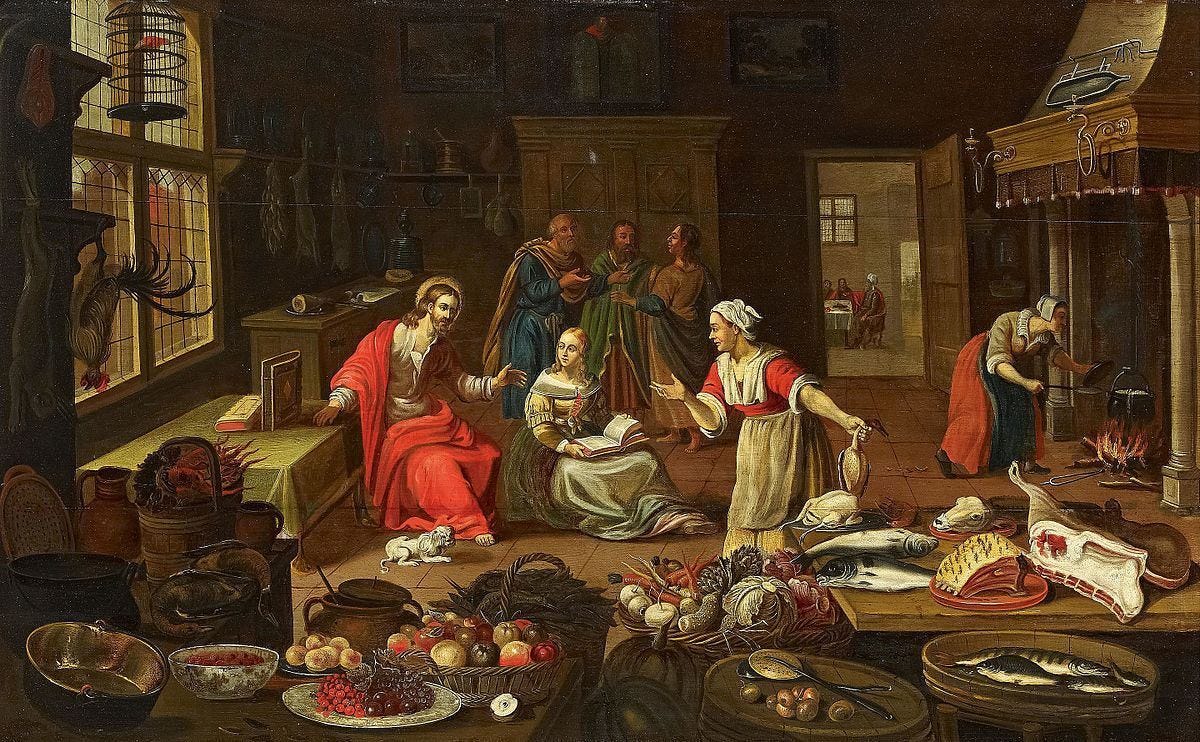About 20 years ago, my friend Kathleen Palmer began looking for every mention of a woman in the Bible, even if it was only a pronoun. Then, she began deeply researching each passage.
Now, from her thousands of pages of notes, she is publishing “Simple Sheology” at pkathleen2003.substack.com. This article, “Martha (Dear) Martha,” is the best I’ve ever read about Martha’s conversation with Jesus in Luke 10. Enjoy!
Poor Martha, she’s got a pretty bad reputation that I don’t think she deserves; let’s see if we can step into her world for a minute and perhaps see her in a different light.
“As Jesus and his disciples were on their way, he came to a village where a woman named Martha opened her home to him. 39 She had a sister called Mary, who sat at the Lord’s feet listening to what he said. 40 But Martha was distracted by all the preparations that had to be made. She came to him and asked, “Lord, don’t you care that my sister has left me to do the work by myself? Tell her to help me!”
41 “Martha, Martha,” the Lord answered, “you are worried and upset about many things,42 but few things are needed—or indeed only one. Mary has chosen what is better, and it will not be taken away from her.”
--Luke 10:38-42, New International Version
(www.biblestudytools.com)
So much judgment has fallen on Martha from these two paragraphs--it’s just a sliver of information. Numerous books have been written about this “frantic” dinner party, typically with object lessons for women, designed to teach us stress management while still maintaining a high standard of homemaking. Popular culture perpetuates a one-dimensional view of Luke’s brief narrative and main character. The highly rated Hulu series, The Handmaid’s Tale, identifies the entire group of forced laborers tasked with mundane household chores as “Marthas.”
I’ve read the books (and watched the show) and self-righteously judged Martha and women like her myself. I have a good friend who cannot watch TV without doing something productive at the same time. She’ll fold clothes, pay bills, or prep food for the week. She’s a multi-tasker--on steroids and someone I would formerly have labeled a “Martha.”
She’s not alone. For some reason, my generation is saddled with the idea that we can do it all. Have a clean house, perfect children, the best career our education will allow, a happy partner, and serve in any way we are asked, at church and in our communities.
I’m tired and a little anxious just writing all that.
But here’s the interesting thing: I don’t think this interplay between Martha, Mary, and Jesus was only about who was cooking supper. Because when that’s the takeaway, I find it very confusing. I’m the product of 35 years in a conservative evangelical church, and honestly, Martha looks like a model hostess. How was she the bad guy here? In my mind, she was justified in calling Mary back to the kitchen and probably fully expected Jesus to agree.
But, as you know, that’s not what happened. We’re so familiar with Jesus’s response that we don’t give it a second thought, but I’d be surprised if anyone at that gathering expected Jesus to affirm Mary’s choice. Because at that time, it was commonly known and accepted that women were not to be instructed in the law, and certainly, they couldn’t be taught by a great rabbi. And, of course, Jesus was a great rabbi.
(www.blackmountainsoftware.com)
Eliezer ben Hurcanus, a prominent Jewish wise man of the first and second century, was quoted as saying several things about women and learning. I’ve chosen a few to illustrate the ancient Jewish view regarding that topic:
"Instructing a woman in the Law is like teaching her blasphemy."
"A woman's wisdom is limited to the handling of the distaff." In other words, women are only fit for spinning wool.
"Let the Law be burned rather than entrusted to a woman." 1
”Rabbi Eliezer’s stand was so strong that he refused to answer an intelligent query from a woman who was one of his primary patrons.” 2
Ouch.
All of this is to say that women were not allowed to be students of Scripture in first-century Judaism. It’s not a stretch to imagine that some of the men at Martha and Mary’s house were wondering why Mary was with them and maybe a little uncomfortable about it. Mary’s intent to be taught by Jesus, at the expense of her more traditional role, would have shocked most Jewish men of that time, and I think it shocked Martha, too. Yes, women traveled with Jesus, which raised some eyebrows, but this? Is Mary taking a man’s position of a disciple? That was a bridge too far.
It’s difficult to overstate how controversial Mary’s behavior was. Let’s not miss, though, that Jesus’ behavior (enabling, even promoting her learning) was equally controversial. A “thumb in the eye” to the conventions of their time and those who would uphold them. Our modern sensibilities see Martha as the oddball in the story; a first-century observer would likely have placed Mary in that role. Hopefully, that perspective helps us view Martha’s request in a kinder light.
Jesus said, “Martha, (and in at least one translation of Scripture, ‘Martha, dear Martha’), you are worried and upset about many things….” We read this, and traditionally, we go straight to her anxiety about a meal she somehow shouldn’t be preparing. Not to put too fine a point on it, but that’s not many things; that’s one thing. In my opinion, Mary’s break from tradition was a big part of Martha’s worry.
But to be fair, she was pretty concerned about that meal. So, let’s go back to that. Let’s step into an ancient Jewish woman’s life again and maybe get a more relatable reading of that part of the story.
Here’s where Martha and I are kindred spirits. I host Thanksgiving for my family every year, and I say the same thing: why is this meal so hard? No joke, I start cooking in September. My mashed potatoes are done and frozen by the end of the month, or I’m behind. I’m an over-preparer. And that’s just the food. I start cleaning the house at the same time, and once it’s clean, I’m freaky protective.
I may have ruined a gathering or two for my family. I get caught up in some idealized notion of how Thanksgiving should be, and if I’m not intentional, I can miss the point of the holiday. I think something similar might have happened with Martha.
She was a classic, traditional Jewish woman, and as such, she would have known as second nature the code of conduct expected of her as a homeowner in a desert community. I found an article about Israel’s hospitality laws. And yes, they’re laws. In our modern world, we’ve co-mingled this idea of entertaining with hospitality. But there’s a big difference. Entertaining is what I do when I invite you to my home, plan and prepare food, and tell you when to show up.
And for the love of all that’s holy, please don’t arrive early.
Just kidding! Sort of.
True hospitality is what I do when I don’t know you’re coming. True hospitality is the ability to welcome surprise visitors graciously. In a community like first-century Bethany, Martha’s home, and a town very close to the desert, unexpected travelers were a normal part of life. If those travelers were not given shelter, food, and water, it was a matter of life or death for them. Martha knew that her God, the God of Israel, required her to take care of unexpected guests. It would have been a mark of shame if she hadn’t prepared in advance to provide for visitors at a moment’s notice.
So, when Jesus arrived at her home, Martha’s pantry would have been filled with plenty of ready-to-serve foods. Foods like homemade cheese, smoked fish, dried fruit, olives, loaves of bread, and wine--more than enough. She could have easily thrown together what’s known in the Middle East as a mezze (meh’ zay) platter and been done with it with very little preparation required. But Jesus was, well, Jesus, the most celebrated traveling rabbi of his time, and whether he was unexpected or not, I believe Martha felt responsible (as a good hostess) to prepare the proverbial fattened calf with all the trimmings for this exceptional guest.
You don’t get out the chips and dip for this guy!
(www.christmasphere.com)
Right or wrong, Martha dismissed the idea of doing the ordinary and pulled out all the stops. I would’ve done the same thing. And that’s hard to do by yourself. So, Mary being in the other room was perhaps a double-whammy insult to Martha’s sensibilities. Not only was it embarrassingly inappropriate, it was very unhelpful.
We’re not told why Mary felt so confident to step out of tradition boldly. But maybe we can better understand why her actions might have been problematic for Martha without vilifying her.
I’m no longer confused when I hear Jesus correct Martha because, in my opinion, the correction wasn’t all that harsh; they were friends. I don’t think He was addressing Martha’s work ethic or the stress bound up in that, but maybe she had misunderstood the purpose of His visit. Jesus’s teaching was meant to be the main course, and as a side dish, everyone was welcome at that table.
And if I haven’t said it yet, I don’t know what happened. I wasn’t there. I can’t tell you with any confidence what happened in my kitchen this morning; I certainly can’t tell you what happened in Martha’s 2000 years ago. The value here is not in what we can prove but rather in how we might gain a fuller perspective of a woman, who I believe is one of the most inaccurately and unfavorably portrayed characters found in the New Testament.










Thanks for pointing out that during the time of Jesus, Mary would have been the oddball. It’s interesting how our Western eyes and culture can miss some very significant lessons from the Bible. Keep teaching us Kathleen! I love it!
This is such helpful insight to an otherwise very confusing and probably misinterpreted situation. Thanks for sharing your perspective. I definitely would’ve been worried about the food. It’s nice to know Jesus would prefer me to sit down and enjoy time with him instead.